Kia Ceed vs Toyota RAV4 – Which model is better for everyday use?
Compare performance, boot capacity, efficiency and price at a glance.
Find out which car is the better choice for you – Kia Ceed or Toyota RAV4?
Costs and Efficiency:
When it comes to price and running costs, the biggest differences usually appear. This is often where you see which car fits your budget better in the long run.
Kia Ceed has a significantly advantage in terms of price – it starts at 23500 £, while the Toyota RAV4 costs 35100 £. That’s a price difference of around 11657 £.
Fuel consumption also shows a difference: Toyota RAV4 manages with 1 L and is therefore decisively more efficient than the Kia Ceed with 6 L. The difference is about 5 L per 100 km.
Engine and Performance:
Power, torque and acceleration say a lot about how a car feels on the road. This is where you see which model delivers more driving dynamics.
When it comes to engine power, the Toyota RAV4 has a decisively edge – offering 306 HP compared to 140 HP. That’s roughly 166 HP more horsepower.
In acceleration from 0 to 100 km/h, the Toyota RAV4 is decisively quicker – completing the sprint in 6 s, while the Kia Ceed takes 9.50 s. That’s about 3.50 s faster.
In terms of top speed, the Kia Ceed performs slight better – reaching 197 km/h, while the Toyota RAV4 tops out at 180 km/h. The difference is around 17 km/h.
Space and Everyday Use:
Whether family car or daily driver – which one offers more room, flexibility and comfort?
Both vehicles offer seating for 5 people.
In curb weight, Kia Ceed is evident lighter – 1298 kg compared to 1745 kg. The difference is around 447 kg.
In terms of boot space, the Toyota RAV4 offers noticeable more room – 580 L compared to 395 L. That’s a difference of about 185 L.
In maximum load capacity, the Toyota RAV4 performs evident better – up to 1690 L, which is about 399 L more than the Kia Ceed.
When it comes to payload, Toyota RAV4 a bit takes the win – 600 kg compared to 490 kg. That’s a difference of about 110 kg.
Who wins the race?
The Toyota RAV4 proves to be is largely superior and therefore becomes our DriveDuel Champion!
Toyota RAV4 is the better all-rounder in this comparison.
 @ Toyota Motor Corporation
@ Toyota Motor Corporation
Toyota RAV4
Kia Ceed
The Kia Ceed is a sensible, stylish hatchback that gives buyers more than they'd expect for the money, blending practical space with crisp, modern looks. It drives with measured confidence and comes loaded with user-friendly kit, so you can enjoy daily life behind the wheel without breaking into a sweat.
details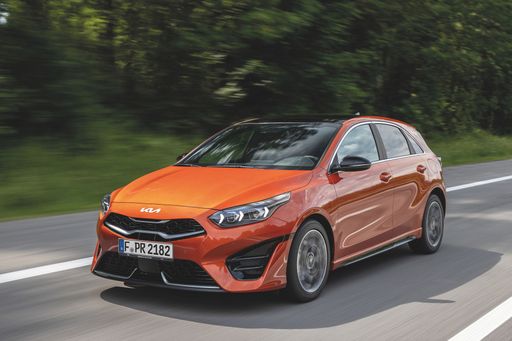 @ Kia Corporation
@ Kia Corporation
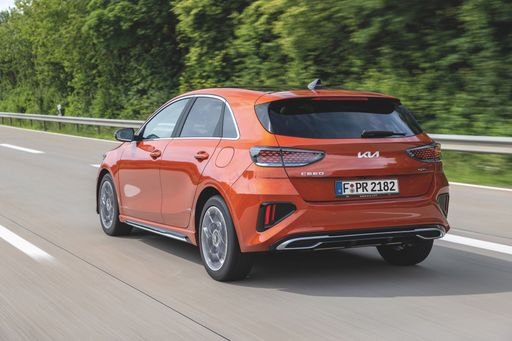 @ Kia Corporation
@ Kia Corporation
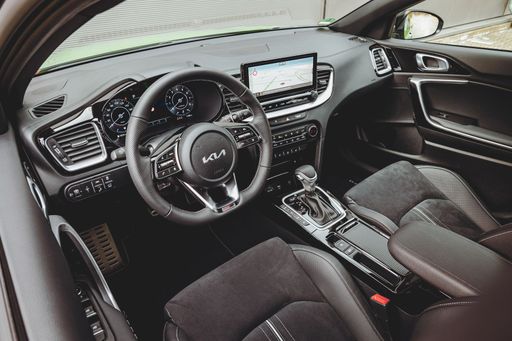 @ Kia Corporation
@ Kia Corporation
Toyota RAV4
The Toyota RAV4 feels like a sensible friend on the road, marrying dependable practicality with a dash of SUV personality that keeps daily driving from turning dull. Comfortable and easy to live with, it looks tough without shouting and quietly gets the job done — a sensible pick for buyers who want versatility without drama.
details @ Toyota Motor Corporation
@ Toyota Motor Corporation
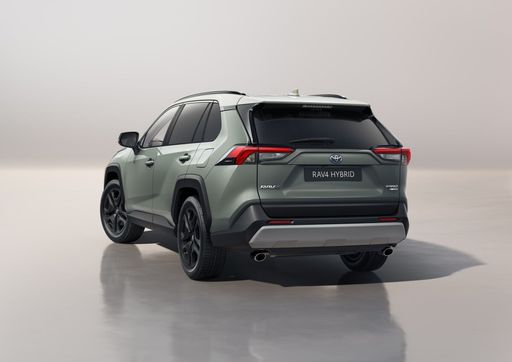 @ Toyota Motor Corporation
@ Toyota Motor Corporation
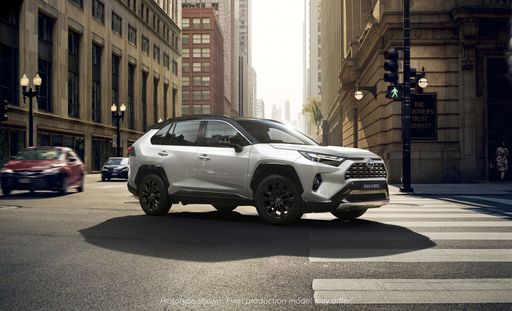 @ Toyota Motor Corporation
@ Toyota Motor Corporation
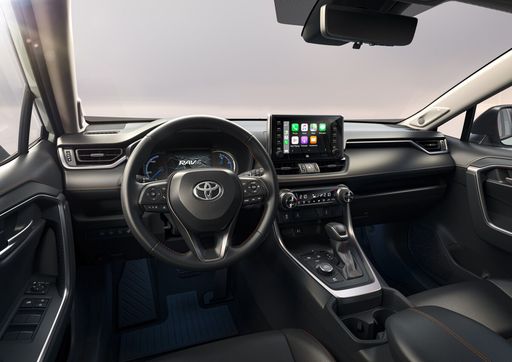 @ Toyota Motor Corporation
@ Toyota Motor Corporation
 @ Kia Corporation
@ Kia Corporation
|
 @ Toyota Motor Corporation
@ Toyota Motor Corporation
|
|
|
|
Costs and Consumption |
|
|---|---|
|
Price
23500 - 26300 £
|
Price
35100 - 55700 £
|
|
Consumption L/100km
6 - 6.4 L
|
Consumption L/100km
1 - 5.6 L
|
|
Consumption kWh/100km
-
|
Consumption kWh/100km
-
|
|
Electric Range
-
|
Electric Range
75 km
|
|
Battery Capacity
-
|
Battery Capacity
-
|
|
co2
137 - 146 g/km
|
co2
22 - 128 g/km
|
|
Fuel tank capacity
50 L
|
Fuel tank capacity
55 L
|
Dimensions and Body |
|
|---|---|
|
Body Type
Hatchback
|
Body Type
SUV
|
|
Seats
5
|
Seats
5
|
|
Doors
5
|
Doors
5
|
|
Curb weight
1298 - 1372 kg
|
Curb weight
1745 - 1910 kg
|
|
Trunk capacity
357 - 395 L
|
Trunk capacity
520 - 580 L
|
|
Length
4315 mm
|
Length
4600 mm
|
|
Width
1800 mm
|
Width
1855 mm
|
|
Height
1447 mm
|
Height
1685 mm
|
|
Max trunk capacity
1253 - 1291 L
|
Max trunk capacity
1604 - 1690 L
|
|
Payload
478 - 490 kg
|
Payload
390 - 600 kg
|
Engine and Performance |
|
|---|---|
|
Engine Type
Petrol, Petrol MHEV
|
Engine Type
Full Hybrid, Plugin Hybrid
|
|
Transmission
Manuel, Automatic
|
Transmission
Automatic
|
|
Transmission Detail
Manual Gearbox, Dual-Clutch Automatic
|
Transmission Detail
CVT
|
|
Drive Type
Front-Wheel Drive
|
Drive Type
Front-Wheel Drive, All-Wheel Drive
|
|
Power HP
100 - 140 HP
|
Power HP
218 - 306 HP
|
|
Acceleration 0-100km/h
9.5 - 13.2 s
|
Acceleration 0-100km/h
6 - 8.4 s
|
|
Max Speed
178 - 197 km/h
|
Max Speed
180 km/h
|
|
Torque
172 - 253 Nm
|
Torque
-
|
|
Number of Cylinders
3 - 4
|
Number of Cylinders
4
|
|
Power kW
74 - 103 kW
|
Power kW
160 - 225 kW
|
|
Engine capacity
998 - 1482 cm3
|
Engine capacity
2487 cm3
|
General |
|
|---|---|
|
Model Year
2024
|
Model Year
2024 - 2025
|
|
CO2 Efficiency Class
E
|
CO2 Efficiency Class
D, B
|
|
Brand
Kia
|
Brand
Toyota
|
What drivetrain options does the Kia Ceed have?
The Kia Ceed is available as Front-Wheel Drive.
The prices and data displayed are estimates based on German list prices and may vary by country. This information is not legally binding.
